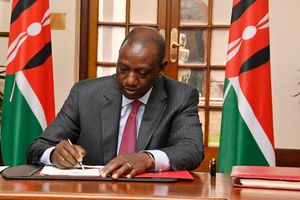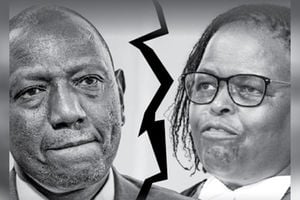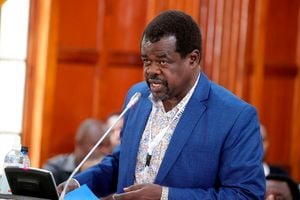
President Ruto's administration has suffered several setbacks in court as judges have put his plans for his administration on hold or quashed some of his appointments.
President William Ruto's administration has suffered several setbacks in court as judges have put his plans for the Kenya Kwanza Administration on hold or quashed some of his appointments.
From blocking the appointment of Chief Administrative Secretaries (CAS), to quashing his new Universal Health Coverage (UHC) programme, to removing people named to various offices, the cases have been numerous.
The list of those filing the cases has been diverse, including civil society organisations such as the Katiba Institute and the Kenya Human Rights Commission (KHRC), the Law Society of Kenya (LSK) and individuals such as Nakuru-based surgeon Dr Magare Gikenyi, Busia Senator Okiya Omtatah and lawyer Saitabao ole Kanchory.
Demonstration
The latest case was brought by the Katiba Institute challenging a ban imposed by acting Inspector General of Police Douglas Kanja on protests in Nairobi city centre and its environs.
In his ruling, High Court judge Bahati Mwamuye said no police officer should act on Kanja's July 17 directive on until the petition is heard.
Kanja had banned all demonstrations in Nairobi city centre and its environs until further notice, ostensibly to ensure public safety.
“Pending the inter-partes hearing of the application dated 18/07/2024, a conservatory order be and is hereby issued restraining the Inspector-General of Police and all other persons serving within the National Police Service, or acting in support of the National Police Service in the discharge of its law enforcement functions, from applying or enforcing the Inspector-General of Police’s impugned decision dated 17/07/2024,” said the judge.
Violence against protesters
In Malindi, High Court Judge Mugure Thande had issued interim orders restraining the security services from using water cannons and tear gas against protesters.
Although the police have largely ignored the court's order, the judge had also banned the use of live ammunition, rubber bullets or other clubs or any form of violence against protesters.
In Nairobi, Judge Francis Gikonyo quashed the appointment of Anthony Mwaura as chairman of the Kenya Revenue Authority (KRA), saying he was given the job while he had an active corruption case in court.
The judge, who has since stayed the decision for 45 days to allow Mwaura to appeal the ruling, said Mwaura's appointment by President Ruto on November 18, 2022 was illegal.
“The appointment herein suffers procedural infirmities and illegality as relevant material and vital aspects having a nexus to the constitutional and legislative purpose of integrity were not taken into account in the actual process of the appointment,” the judge said.
Taskforce
When President Ruto appointed the Presidential Task Force on Human Resources for Health, several pressure groups rushed to court arguing that the body was unconstitutional.
Instead, the lobby groups want the court to order the government to make the Kenya Health Human Resource Advisory Council operational.
The case will be heard next week.
An earlier task force appointed by Ruto to audit the public debt was temporarily blocked pending the determination of a petition filed by Dr Gikenyi and Eliud Matindi.
Appointments
And although the President has dropped plans to appoint CASs, a new case has been filed challenging the same.
Gikenyi had challenged several sections of the National Government Coordination Act, which was recently amended by Parliament to create the CAS offices and the Head of Public Service.
The medical doctor pointed out that the High Court, in an earlier petition challenging the creation of the CAS posts, had ruled that the office was equivalent in all respects to that of Principal Secretary.
Affordable housing and other levies
Several petitions challenging the Affordable Housing Act are pending before the High Court.
Although a three-judge bench declined to suspend the collection of the levy, the court agreed that the issues raised in the petitions were weighty.
Six petitions were filed challenging various provisions of the Affordable Housing Act, 2023 and were consolidated before Chief Justice Martha Koome appointed Justices Olga Sewe, John Chigiti and Josephine Mong'are to hear the cases.
The petitioners argue that the housing levy was set at 1.5 per cent without a study to show how the fund will work, yet no money should be collected from the public without an expenditure line and a fully functioning fund being established as required by the law.
President Ruto signed the Affordable Housing Bill, 2023 into law in March 2024, paving the way for the resumption of the levy, which had previously been stopped by the court.
Employees pay 1.5 per cent of their gross monthly salary, which is matched by the employer.
Under the new law, Kenyans in the informal sector and other non-salaried workers will also pay the same from their gross monthly earnings to fund President Ruto's pet housing project.
Gikenyi, one of the petitioners, wants the court to declare that there was insufficient public participation before the law was passed.
He also argues that sections 3 and 4 of the Act are unconstitutional as they threaten socio-economic rights and are inconsistent with the Constitution.
Last year, the High Court suspended a notice published in the Kenya Gazette on November 6, which reviewed the fees for critical documents such as identity cards, passports and government staff ID cards, pending the determination of a petition filed by Dr Gikenyi.
Healthcare plan
Perhaps the biggest loss for President Ruto so far has been the Universal Health Coverage (UHC) plan, which suffered a blow after a three-judge bench of the Supreme Court struck down the laws enacted to replace the National Hospital Insurance Fund (NHIF).
Justices Alfred Mabeya, Robert Limo and Fred Mugambi nullified the Social Health Insurance Act (SHIA) 2023, the Primary Health Care Act, 2023 and the Digital Health Act, 2023, which replaced the National Hospital Insurance Fund (NHIF).
However, the judges suspended their ruling for 45 days to allow the government to appeal the decision. The judges had suspended the implementation of the laws for 120 days to allow the government to correct the illegalities identified in the ruling.
Former Health CS Susan Nakhumicha had defended the laws, saying they were meant to promote the implementation of UHC and ensure that every person had access to the highest standard of health care.
Shakahola
In another loss for Ruto, a commission of inquiry he set up to investigate the deaths in Shakahola, Kilifi County, in May last year was quashed.
Justice Mugambi agreed with Azimio La Umoja-One Kenya Coalition that President Ruto did not have the power to give a commission of inquiry specific constitutional mandates that belong to independent constitutional commissions and independent offices.
The judge said it was not constitutionally viable to establish a commission of inquiry with a parallel mandate to investigate the deaths, which fall under the mandate of the police.
skiplagat@ke.nationmedia.com







